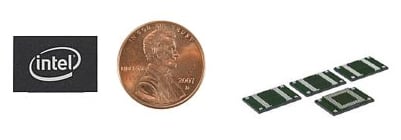Intel's Solid State Drive -- The Future of Mobile Memory?

We have been talking about developing technologies for offering massive storage for mobile devices for 2 ½ years now in the "Flash or HDD? That's the Question thread". Intel just announced a huge step in offering GBs for cell phones with their new Solid State Drive (SSD) that is smaller than penny and weighs less than a drop of water, according to their press release:
The tiniest in the industry, the Intel® Z-P140 PATA SSD is designed for ultra-small mobile internet devices, digital entertainment and embedded applications and is part of the proposed Intel “Menlow” platform. The Intel Z-P140 PATA SSD comes in 2 Gigabyte (GB) and 4GB densities, extendable to 16GB.
According to the Intel Product Brief this little SSD can hold its own with Read Throughput at 40 Megabytes / sec and Write Throughput at 30 Megabytes / sec and is tested with a Mean Time Between Failures at 2,500,000 hours (which if you are curious is 104,167 days... which is just over 285 years... which leads to... how in the heck did they come up with that?).
Today we are begging phone manufacturers to include at least 128 mb in any given phone and we willingly fall to our knees in praise when they put 256 mb of memory / storage in a phone. Could you imagine the reality of having somewhere between a 2 GB to 16 GB of internal memory / storage on a phone be commonplace? Because we here at WMExperts can (and do).
When is this really going to be a reality? I am not sure. The Intel Fact Sheet does not come out and say specifically, but it does alludes to the possibility that it will be released with their proposed Menlow platform, which will be released to manufacturers sometime during the first half of 2008. Though, again, it's not clear that that the Z-P140 PATA SSD will be included with this first generation release of the Intel Menlow platform.
All of which means that 2009 is probably the most optimistic projection for inclusion in GSM phones. For those of us on CDMA networks here in the states, well, we'll probably be waiting another year after that for the typical catch-up and personalization phase (assuming, of course, that our CDMA carrier is even around anymore!)
Get the Windows Central Newsletter
All the latest news, reviews, and guides for Windows and Xbox diehards.
Home to the most invested and passionate Microsoft fans, Windows Central is the next generation destination for news, reviews, advice and buying recommendations on the Windows, PC and Xbox ecosystems, following all products, apps, software, AI advancements, and accessories. We've been around for more than decade, and we take our jobs seriously. Windows Central writers and editors value accuracy and editorial independence in everything we do, never receiving compensation for coverage and never pulling punches.
